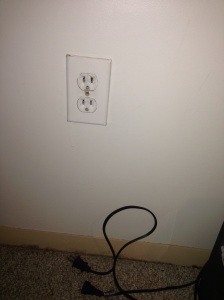
My kids were the first to ever mention it to me. However, since that revelation a number of people have told me, “Denise? You mimic every facial expression I have!” Some said so with exasperation, and some with amusement. My daughter, age approximately ten-years-old, interrupted herself describing something funny that happened in a class to exclaim, “Mom! You crack me up! You make the same faces I do when I talk!”
Sort of like “monkey see, monkey do” I suppose… but not because I was learning through observational learning or imitation. Instead, as a person with hearing loss, I carefully watched the facial expressions to better speech read and pick up more than I could by simply hearing pieces of words.
It’s different than being empathetic. I know because I’m one of those folks who will laugh with you and cry with you. Yup. Literal tears and equal sobs and hiccups. Don’t get me wrong! I’m sincere! I just get very emotionally involved in communicating and have been known to laugh, cry, or “blow my top” just in commiseration!
I “hear again” fairly well now. I’m bi-modal – meaning I have one cochlear implant, one hearing aid, but AIDED in both ears to better hear. Ideal environments are one-on-one in quiet places. I hear well with only some necessary clarification even in noisier environments. However, despite hearing better, I still have the habit of mirroring people’s emotions and facial expressions.
I learned ASL long before I lost my own hearing. I had some friends in college who were culturally deaf… and this motor-mouth wanted to talk to them. Most people who are late-deafened never learn ASL. (Why? They were born hearing and likely most of the people they know are verbal communicators). However, ASL is actually made up of three things: sign, facial expression, and body language.
So perhaps that is why I mirror facial expressions. More likely? My best guess is that people with hearing loss have a need to really focus, really TUNE IN when communicating. Sure, we speech read to a degree, but we watch people’s faces too. Are they smiling, scowling, surprised or crying? These facial expressions matched with what we CAN hear, help us to determine the overall content of what a person is communicating. So guess what? If you know someone with hearing loss, it can greatly benefit that person for your face to match your mouth.
Sarcasm is a Problem
How do I know this can be a problem? I have a sarcastic son. As a matter of fact, my daughter has been described as having a dry wit. My husband? KING OF SARCASM. It can be really hard to communicate if their face is saying one thing (or nothing at all…) and their mouths are saying something else. Even “hearing again” as well as I do I was taken aback by a conversation I had on the training floor at Fidos For Freedom recently.
Steve (name changed), a fellow client and new buddy of mine, came up to me in his scooter with this big signature smile on his face. “HEY! (What can I say… I’m exuberant!) How has your week been!?”
With huge smile and sporting numerous dimples he responded, “Hi, Denise. Hi Chloe. I had a really bad week!”
I paused a moment. Then a second moment went by. I was confused. In this big cavernous training room with numerous sounds competing with what was coming out of his mouth, his face did not match what I thought I heard.
“Ummmm.” (Yeah. I’m eloquent).
Thankfully, he took my pause as permission to elaborate. It only took another sentence or two for me to realize – yes. He HAD indeed had a bad week, but ever optimistic, positive-thinking young man that he is, wasn’t going to let that stop him from smiling and enjoying his training and friends at Fidos For Freedom.
Another example of mixed signals:
In class today a student rushed into class a few minutes late, causing me to skitter out of the way before I was knocked flat. Big smile on her face, she stopped with big eyes and eager expression to spout, “Crap. Crap, crap, crap. I could kill myself!”
Again, tempered with years of experience I intelligently responded…
“Ummmm.”
“We have a quiz today, don’t we? Crap! I forgot!”
Thankfully people do tend to continue, helping to CLEAR UP that initial confusion. It is a much tougher situation when you get mixed signals and then they pause waiting for a response. You know that terrifying look? Shoulders turned slightly towards you with eyebrows raised and expectant look? (When I see it the blood rushes right out of my face!) Then I have to ask for clarification, “Could you repeat that?”
Many times mirroring another’s expression can be very helpful. If they look concerned and you mirror that concern, it may clue them in you are taking something they are saying seriously – when perhaps it is NOT. I’ve had friends pat my shoulder and say, “Relax. I’m kidding”
Being willing to ask for clarification is key. People with hearing loss cannot be afraid to admit you did NOT get it. You don’t need to complain. You don’t need to “ticket” repeat offenders. No need to point and loudly exclaim, “Everyone look at this person! They are expressively dyslexic!” (Ok, yeah, I made that phrase up).
Instead, just say, “Oh wow. You know what? I didn’t hear that right because your expression doesn’t match what I thought I heard”. That’s enough! In the end… you just may assist helping others become more expressive, genuine communicators. Hey… we can dream, right?
Denise Portis
© 2013 Personal Hearing Loss Journal


